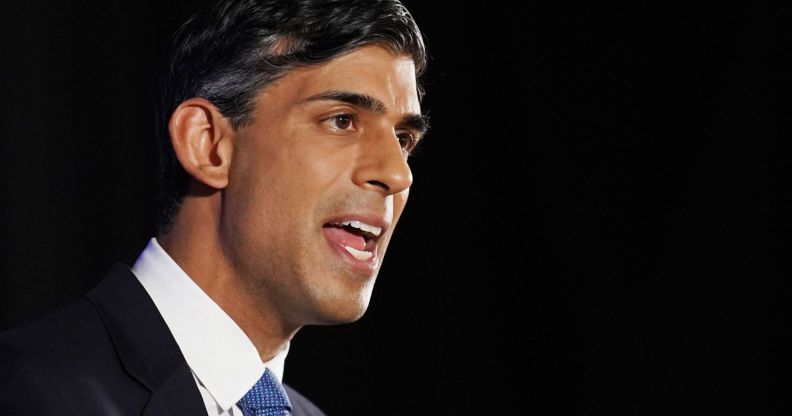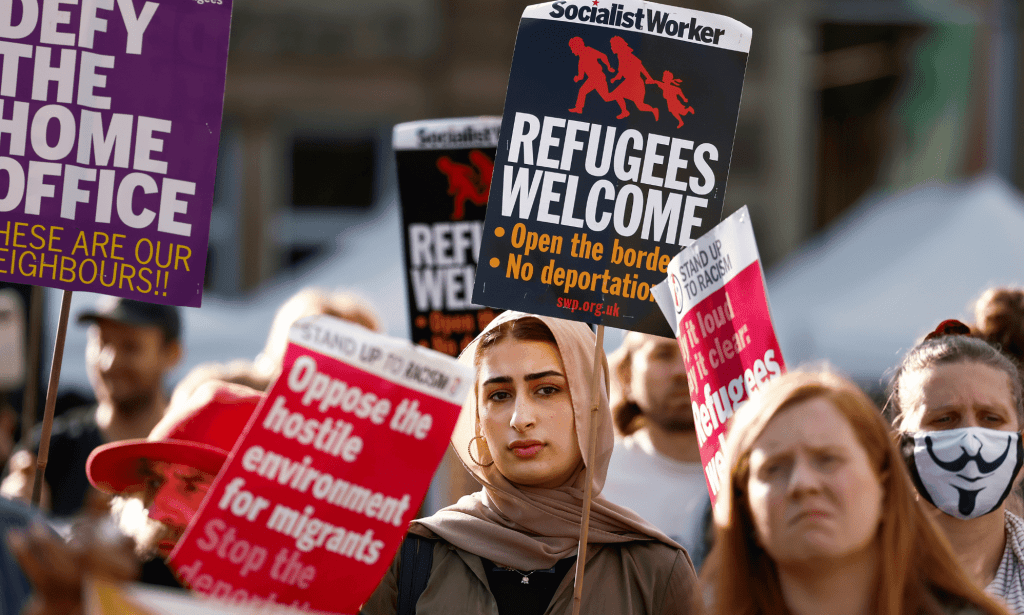UK government told to give LGBTQ+ Ugandans safe asylum route as Anti-Homosexuality Bill looms

UK prime minister Rishi Sunak. (Getty)
Politicians and charities are calling on the UK government to create a safe and legal route for LGBTQ+ people fleeing Uganda over the Anti-Homosexuality Bill.
Uganda’s parliament passed the anti-LGBTQ+ bill for a second time on Tuesday (2 May), removing a provision that would have made it illegal to simply identify as LGBTQ+.
It remains a deeply troubling piece of legislation designed to persecute the community. Within its clauses is the introduction of the death penalty for the crime of “aggravated homosexuality” – ostensibly said to mean having sex with a minor, having sex while HIV positive or engaging in incest.
With the bill now awaiting president Yoweri Museveni’s signature, the lack of safe asylum routes for LGBTQ+ Ugandans is an urgent issue.
“The Anti-Homosexuality Bill will mean that Uganda has among the harshest anti-LGBTQ+ laws in the world, and violent attacks on LGBTQ+ Ugandans are likely to increase in its wake,” Labour MP Nadia Whittome told PinkNews.
“The UK government must urge Uganda’s president to veto the bill and create safe routes for LGBTQ+ refugees fleeing persecution to rebuild their lives in the UK.”

Human rights campaigner Peter Tatchell said: “LGBT+ Ugandans face the triple whammy of the Anti-Homosexuality Bill, rising arrests and mob violence. They are in extreme danger.
“The UK government has a duty under the Refugee Convention to provide a safe route and safe haven to LGBT+ Ugandans at risk of persecution.
The activist’s Peter Tatchell Foundation has supported hundred of LGBTQ+ refugees, many from Uganda, Tatchell continued.
“Once granted asylum, they have become economically productive members of society, working hard, paying tax and contributing to the communities where they live.
“Instead of demonising refugees and making it almost impossible for them to gain asylum, the government should recognise that they are a positive asset to the UK and facilitate safe, legal routes for them to come here.”
Governments must oppose Uganda’s ‘brutal’ anti-LGBTQ+ bill
Maggie Chapman, equalities spokesperson for the Scottish Greens, branded the Ugandan bill “abhorrent and appalling”.
“There is an obligation on all governments who believe in human rights to oppose this brutal bill. Nobody should be attacked or criminalised for who they are or who they love,” she told PinkNews
“The [UK] Home Office has an absolutely shocking track record when it comes to the rights of refugees and oppressed communities, but that can’t stop the calls or demand for change.
“It is time for the UK government and others to condemn these brutal laws in the strongest terms and to provide real and concrete support and safety to those who are being targeted, hurt or abused by them.”

Rainbow Migration, a charity that supports LGBTQ+ people seeking asylum in the UK, said the government’s Illegal Migration Bill would make it even harder for queer Ugandans to find safety elsewhere.
That bill, currently in the House of Lords, would mean that asylum seekers who arrive in the UK through unapproved routes, such as via the Channel, would be removed to Rwanda or another third country.
“Over the last year and a half we’ve supported more than 20 Ugandan LGBTQI+ people to seek safety here and we are worried that these new laws mean many more will have no choice but to flee Uganda,” a Rainbow Migration spokesperson said.
“There is no resettlement scheme for members of the LGBTQI+ community in Uganda, who under the proposed anti-gay law could face life in prison or even the death penalty.
“This makes it a lot harder for LGBTQI+ Ugandans to find safety in the UK, and the UK government’s new refugee ban bill will make it almost impossible.”
Rainbow Migration described the UK’s asylum system as “extremely distressing, degrading and dehumanising”, saying LGBTQ+ people are forced to “prove” their sexual orientation or gender identity if they want to be granted refugee status.

The charity also warned that LGBTQ+ Ugandans who seek asylum in the UK will likely be detained in immigration detention under current government policy. Research has shown that LGBTQ+ people face bullying, harassment and abuse in the UK’s immigration detention centre.
“As caring people, most of us would welcome LGBTQI+ people that can’t be themselves in other countries, and that are hoping to rebuild their lives in the UK,” the spokesperson said.
“However, this government is telling them that they’ll be punished for coming here, locked up and sent away to another country, perhaps one they’ve never heard of, and that may be dangerous for LGBTQI+ people.”
Governments, politicians and human rights organisations across the world have spoken out against Uganda’s Anti-Homosexuality Bill since its first iteration was passed by parliament in March.
Volker Türk, UN high commissioner for human rights, branded the bill “discriminatory”.
“This law, if signed into force, will have serious negative repercussions on society as a whole, and erode gains made over years,” he said.
LGBTQ+ Ugandans have spoken out fiercely against the bill. Frank Mugisha, executive director of Sexual Minorities Uganda, told PinkNews that it could trigger a “genocide” for LGBTQ+ people.
“There’s a lot of fear. I’m getting a lot of messages from people telling me they want to flee the country. They’re worried about what’s next if the bill is signed,” he said.
The bill also prohibits the promotion of homosexuality and upholds the criminalisation of gay sex, which was already illegal under a colonial-era law put in place under British rule.

